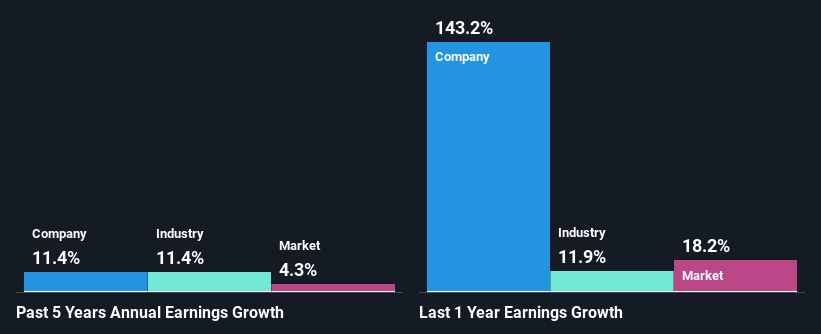Meridian Energy Limited's (NZSE:MEL) Fundamentals Look Pretty Strong: Could The Market Be Wrong About The Stock?
With its stock down 7.4% over the past three months, it is easy to disregard Meridian Energy (NZSE:MEL). However, stock prices are usually driven by a company’s financials over the long term, which in this case look pretty respectable. Specifically, we decided to study Meridian Energy's ROE in this article.
Return on equity or ROE is a key measure used to assess how efficiently a company's management is utilizing the company's capital. In other words, it is a profitability ratio which measures the rate of return on the capital provided by the company's shareholders.
See our latest analysis for Meridian Energy
How Is ROE Calculated?
Return on equity can be calculated by using the formula:
Return on Equity = Net Profit (from continuing operations) ÷ Shareholders' Equity
So, based on the above formula, the ROE for Meridian Energy is:
8.2% = NZ$428m ÷ NZ$5.2b (Based on the trailing twelve months to June 2021).
The 'return' is the income the business earned over the last year. That means that for every NZ$1 worth of shareholders' equity, the company generated NZ$0.08 in profit.
What Has ROE Got To Do With Earnings Growth?
Thus far, we have learned that ROE measures how efficiently a company is generating its profits. Depending on how much of these profits the company reinvests or "retains", and how effectively it does so, we are then able to assess a company’s earnings growth potential. Assuming everything else remains unchanged, the higher the ROE and profit retention, the higher the growth rate of a company compared to companies that don't necessarily bear these characteristics.
Meridian Energy's Earnings Growth And 8.2% ROE
At first glance, Meridian Energy's ROE doesn't look very promising. Although a closer study shows that the company's ROE is higher than the industry average of 0.8% which we definitely can't overlook. This probably goes some way in explaining Meridian Energy's moderate 11% growth over the past five years amongst other factors. Bear in mind, the company does have a moderately low ROE. It is just that the industry ROE is lower. Therefore, the growth in earnings could also be the result of other factors. For example, it is possible that the broader industry is going through a high growth phase, or that the company has a low payout ratio.
Next, on comparing Meridian Energy's net income growth with the industry, we found that the company's reported growth is similar to the industry average growth rate of 11% in the same period.
Earnings growth is a huge factor in stock valuation. The investor should try to establish if the expected growth or decline in earnings, whichever the case may be, is priced in. Doing so will help them establish if the stock's future looks promising or ominous. If you're wondering about Meridian Energy's's valuation, check out this gauge of its price-to-earnings ratio, as compared to its industry.
Is Meridian Energy Using Its Retained Earnings Effectively?
The really high three-year median payout ratio of 154% for Meridian Energy suggests that the company is paying its shareholders more than what it is earning. In spite of this, the company was able to grow its earnings respectably, as we saw above. Although, the high payout ratio is certainly something we would keep an eye on if the company is not able to keep up its growth, or if business deteriorates. You can see the 2 risks we have identified for Meridian Energy by visiting our risks dashboard for free on our platform here.
Additionally, Meridian Energy has paid dividends over a period of seven years which means that the company is pretty serious about sharing its profits with shareholders. Based on the latest analysts' estimates, we found that the company's future payout ratio over the next three years is expected to hold steady at 161%. Regardless, Meridian Energy's ROE is speculated to decline to 5.9% despite there being no anticipated change in its payout ratio.
Summary
Overall, we feel that Meridian Energy certainly does have some positive factors to consider. Specifically, its decent ROE which likely contributed to the growth in earnings. Bear in mind, the company reinvests little to none of its profits, which means that investors aren't necessarily reaping the full benefits of the decent rate of return. Having said that, on studying current analyst estimates, we were concerned to see that while the company has grown its earnings in the past, analysts expect its earnings to shrink in the future. Are these analysts expectations based on the broad expectations for the industry, or on the company's fundamentals? Click here to be taken to our analyst's forecasts page for the company.
This article by Simply Wall St is general in nature. We provide commentary based on historical data and analyst forecasts only using an unbiased methodology and our articles are not intended to be financial advice. It does not constitute a recommendation to buy or sell any stock, and does not take account of your objectives, or your financial situation. We aim to bring you long-term focused analysis driven by fundamental data. Note that our analysis may not factor in the latest price-sensitive company announcements or qualitative material. Simply Wall St has no position in any stocks mentioned.
Have feedback on this article? Concerned about the content? Get in touch with us directly. Alternatively, email editorial-team (at) simplywallst.com.

 Yahoo Finance
Yahoo Finance 
